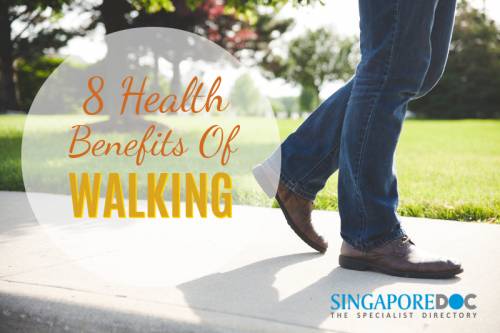8 Health Benefits of Walking

Going for regular walks is one of the best and simplest things you can do for your health. The faster, farther and more frequently you walk, the greater the benefits. Here's what you can expect when you start walking for just 30 minutes every day, most days of the week.
1. Walking strengthens your heart & reduces risk of chronic diseases
One of the most cited studies on the health benefits of walking, published in the New England Journal of Medicine in 2002, found that those who walked at least 30 minutes of moderate intensity on 5 or more days per week had a 30% lower risk of cardiovascular disease, compared with those who did not walk regularly.
(Ref: New England Journal of Medicine: Walking Compared with Vigorous Exercise)
Walking also reduces your blood sugar levels and your overall risk of developing Type 2 diabetes. It also raises levels of HDL (good) cholesterol, whilst reducing the levels of LDL (bad) cholesterol.
Researchers at the University of Boulder Colorado and the University of Tennessee found that regular walking lowered blood pressure by as much as 11 points and may reduce the risk of stroke by up to 20% to 40%.
It has also been found that a brisk 30-minute walk every day helps reduce the risk of strokes by up to 27%.
2. Walking lowers your risk of developing Cancer
Walking, together with other forms of exercise, lowers the levels of estrogen, insulin and certain growth factors, that have been associated with cancer development. Exercise also reduces inflammation and improves immune system function.
There is substantial evidence that higher levels of physical activity is associated with lower risk of several cancers.
(i) Colon Cancer: Physically active individuals were found to have a 24% lower risk of colon cancer that those who were least physically active.
(ii) Breast Cancer: Several studies also report an average breast cancer risk reduction of 12% in physically active women. This reduction of risk was found in both premenopausal as well as postmenopausal women, however, the association is stronger for postmenopausal breast cancer.
(iii) Endometrial Cancer: The average endometrial cancer risk reduction was found to be about 20% in physically active women.
(Ref: National Cancer Institute: Physical Activity & Cancer)
3. Walking helps you burn calories and lose weight
As a rough gauge, an average person will burn about 100 calories by walking 1 mile. Finding to get more walking done in your daily routine will go a long way to helping you burn more calories and lose weight. Take the stairs instead of the escalator or lift, don't just stand around while waiting -- walk around, go for after dinner strolls etc. Get a Bit more Fit with a Fitbit.
4. Walking helps prevents dementia
Walking, running, yoga and tai chi have all been shown to boost the brain power in people over 50. But the truth is that any form of exercise which leaves you breathless is good for your brain. So, exercise which has been long known to be good for the heart, is also good for the brain.
(Ref: Exercise keeps dementia at bay)
5. Walking tones your legs, bums and tums
Tone up your calves, quadriceps, hamstrings and gluteals (bum muscles) by walking regularly. Though not targeted directly, your upper body core muscles are also exercised by helping to keep you upright and balanced as you walk.
6. Walking boosts vitamin D levels
As most of us tend to spend most of our days indoors, Vitamin D deficiency has become more common than we think it is. Whilst we can take supplements or get it through eating the right Vitamin D rich foods, exposure to sunlight is still the very best way to get our Vitamin D. So get out there, go for a walk and get more the Vitamin D you need.
7. Walking energises you
When you are fatigued, the last thing you'll think of doing is going out and getting some exercise. But new research shows that regular, low-intensity exercise may help boost energy levels in people suffering from fatigue.
Physical activity increases your energy levels through many different means. It increases the blood flow, delivers more oxygen to your cells and improves your overall cardiovascular fitness. Regular physical activity also increases production of hormones such as thyroid-stimulating hormone, testosterone, human growth hormone, and catecholamines, all of which help increase your metabolism and give you more energy
(Ref: The New York Times: The Cure for Exhaustion? More Exercise)
8. Walking Improves Your Mood
It’s true – exercise boosts your mood. Research shows that regular walking actually releases feel-good endorphins and reduces hostility, stress and anxiety. In fact, if you walk with a friend or partner, the social interaction helps you keep connected and will go a substantial way into helping improve your mood.
(Ref: NCBI - Exercise for Mental Health)
Further Reading
The article above is meant to provide general information and does not replace a doctor's consultation.
Please see your doctor for professional advice.
